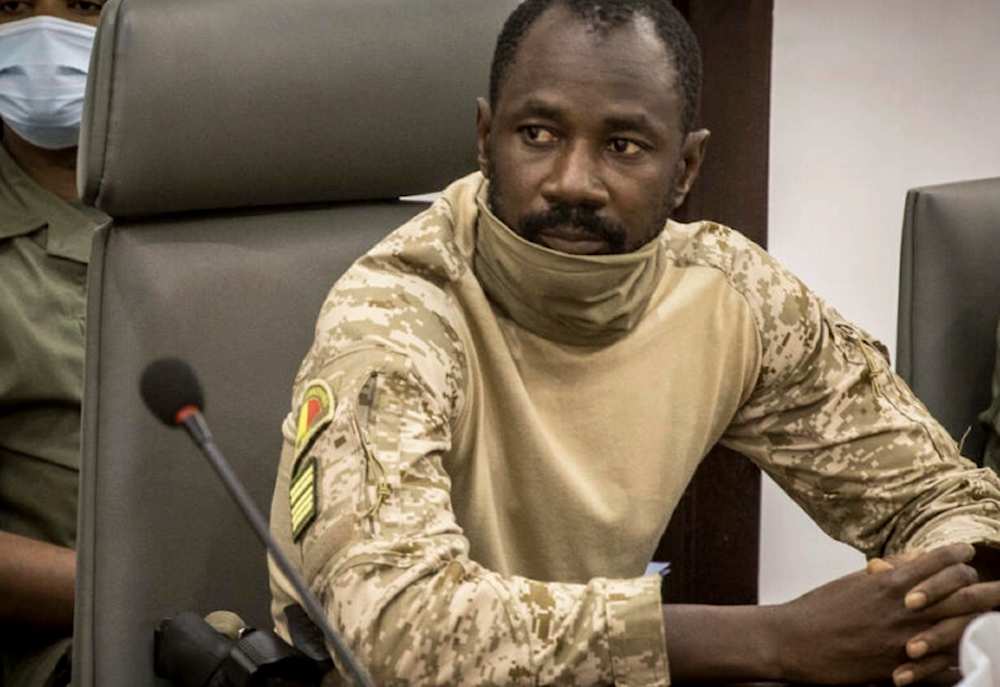Mali junta lifts suspension on political party activities
The announcement comes after "the government was able to contain all the threats of public disorder that hung over" the national dialogue for peace.
-

In this August 22, 2020 file photo, Col. Assimi Goita meets with a delegation from ECOWAS at the Defense Ministry in Bamako, Mali. (AP)
Mali's military junta has lifted a ban on political party activities meant to maintain public calm, the council of ministers announced on Wednesday.
The ban was announced in April, just days before a national peace dialogue began in the Sahelian nation.
"By taking this deterrent measure, the government was able to contain all the threats of public disorder that hung over this major event," the council stated.
Given the renewed emphasis on implementing the recommendations of the April 13 - May 10 peace process, the administration would allow political parties to resume their operations, it stated.
Mali expelled the French-backed G5 anti-jihadist force in 2022 and the UN peacekeeping mission in 2023, after the current leadership gained control of the government.
A new wave of coups in Western Africa has seen military juntas take control of their countries, threatening French and Western interests and influence in the region.
Since one in August 2020 in Mali, there have been eight coups in West and Central Africa, including those in neighboring Burkina Faso and Niger.
Sahel states 'irrevocably turned backs' on ECOWAS: Niger's leader
Niger's military leader Abdourahamane Tiani made it clear on Saturday that the people of his country, along with neighbors Mali and Burkina Faso, have "irrevocably turned their backs" on the West African regional bloc.
The comments were made at the first summit of the Alliance of Sahel States (AES), established by Niger, Mali, and Burkina Faso after they withdrew from the Economic Community of West African States (ECOWAS) earlier this year.
"Our people have irrevocably turned their backs on ECOWAS," stated Tiani to his fellow Sahel leaders, Burkina Faso's military-led President Ibrahim Traore and Malian Colonel Assimi Goita, who all came to power through coups between 2020 and 2023, at the gathering's opening in Niamey, the capital of Niger.
The three AES countries accuse ECOWAS of being manipulated by former colonial ruler France, with Tiani calling for the new bloc to become a "community far removed from the stranglehold of foreign powers."
Niger, Mali, and Burkina Faso's military leaders have all sought to reject French influence, expelling French troops from their countries and turning instead toward what they call their "sincere partners" -- Russia, Turkey, and Iran. They emphasize sovereignty as a guiding principle of their governance and aim to establish a common currency.
The trio also accuses ECOWAS of not doing enough to combat terrorist insurgencies, a recurring problem in the Sahel.
"The AES is the only effective sub-regional grouping in the fight against terrorism," Tiani stressed on Saturday, criticizing ECOWAS for its "conspicuous lack of involvement in this fight."
Relations between the trio and ECOWAS deteriorated significantly following the July 2023 coup which brought Tiani to power in Niger.
ECOWAS imposed heavy economic sanctions on Niger in response and threatened military intervention to restore ousted President Mohamed Bazoum to power.
Although those sanctions were lifted in February, relations between the two sides remain strained.

 3 Min Read
3 Min Read








